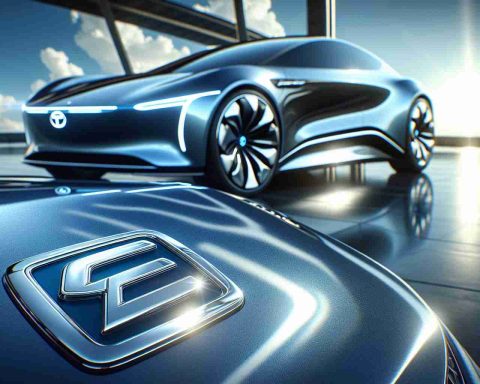- South Korea is advancing towards sustainability with a groundbreaking hydrogen engine developed by KIMM and Hyundai-Kia’s Zero-Carbon Engine Research Lab.
- This engine uses direct hydrogen injection, potentially eliminating vehicle greenhouse gas emissions.
- Operating at over 30 bar pressure, it achieves ultra-low combustion with 98% less carbon dioxide emissions compared to gasoline engines.
- It meets strict EU standards, cutting fine particle emissions by 90% and reducing nitrogen oxides (NOx) emissions to less than 15 parts per million.
- Hydrogen emerges as a strong contender in achieving zero-emission vehicles, challenging battery-powered electrics.
- This innovation signals a shift towards a hydrogen-based economy, aiming for a sustainable future in automotive technology.
- Large-scale trials are ongoing, with optimism for widespread adoption and redefining the transportation landscape.
Amidst the global surge towards sustainability, South Korea stands on the brink of a potentially revolutionary advancement. A team of visionary researchers at the Korean Institute of Machinery and Materials (KIMM) and Hyundai-Kia Motor Company’s Zero-Carbon Engine Research Lab has unveiled a groundbreaking hydrogen engine that could redefine the automotive industry’s future.
Imagine a sleek car sprinting silently down an open road, expelling nothing more than a whisper of water vapor into the air. This is the vision these researchers have made conceivable through a pioneering hydrogen-powered engine. The engine employs a novel method of direct hydrogen injection in a two-liter format, allowing vehicles to operate entirely on hydrogen — a step that could potentially make greenhouse gas emissions from vehicles a memory of the past.
The technical marvel of this engine lies in its ability to reach pressures over 30 bars – this is over 30 times that of the atmospheric pressure. Such immense pressure enables ultra-low combustion, delivering remarkable engine performance without sacrificing environmental integrity. The implications are staggering, boasting a reduction in carbon dioxide emissions by an astounding 98% compared to traditional gasoline engines. Fine particle emissions also plummet by 90%, meeting even the most stringent European Union emissions standards.
Moreover, the cooler combustion temperatures typical of hydrogen engines come with an unexpected benefit: significantly reduced nitrogen oxides (NOx) emissions. This hydrogen engine manages to emit NOx at levels less than 15 parts per million, even without the customary exhaust treatment systems, setting a new bar for eco-friendly automotive innovation.
As the planet’s appetite for clean energy solutions surges, hydrogen emerges as a viable contestant in the race towards zero-emission vehicles. While the engine is still being fine-tuned through rigorous trials, its potential to redefine sustainable transportation is immense. Researchers are optimistic, looking to the horizon of large-scale tests that will cement its place in future automobiles.
The narrative of the automobile industry is being rewritten, with hydrogen playing a starring role. As the road ahead unfurls, support for hydrogen technology in automobiles could pave the way for a cleaner, more efficient transportation ecosystem, giving battery-powered electrics a run for their money. If proven successful, this innovation may not only complement current green vehicle trends but hike the world closer toward a hydrogen-based economy much faster than anticipated.
In this unfolding story of technological evolution, the hydrogen engine isn’t just a leap; it’s a beacon heralding a new era of sustainable mobility. The journey is still ongoing, but the finish line beckons a brighter, cleaner future.
South Korea’s Hydrogen Engine: The Future of Eco-Friendly Cars?
Introduction
As sustainability continues its upsurge globally, South Korea is positioning itself as a leader in eco-friendly automotive technology. The Korean Institute of Machinery and Materials (KIMM) and Hyundai-Kia Motor Company’s Zero-Carbon Engine Research Lab are spearheading this movement with their groundbreaking hydrogen engine, potentially revolutionizing the automotive future.
Features and Specifications of the Hydrogen Engine
– Direct Hydrogen Injection: Utilizing a pioneering method within a two-liter format, the engine operates entirely on hydrogen.
– High Pressure Performance: Achieves pressures exceeding 30 bars, enabling ultra-low combustion for exceptional engine performance and minimal environmental impact.
– Impressive Emissions Reduction:
– 98% decrease in CO2 emissions compared to traditional gasoline engines.
– 90% reduction in fine particle emissions, compliant with the EU’s stringent standards.
– NOx emissions are maintained at below 15 ppm, eliminating the need for additional exhaust treatments.
Pros & Cons Overview
Pros:
1. Environmental Benefits: Substantial reduction in greenhouse gases and pollutants, making it significantly cleaner than gasoline engines.
2. Potential for Sustainable Expansion: Aligns with global goals towards zero-emission transportation.
3. Fuel Accessibility: Hydrogen can be produced locally from various renewable resources, reducing dependency on fossil fuels.
Cons:
1. Infrastructure Challenges: Limited hydrogen refueling stations remain a significant hurdle for widespread adoption.
2. Cost Concerns: Hydrogen production and storage are currently more expensive than conventional fuel options.
3. Safety Considerations: Questions about the safety of storing and handling hydrogen need continuous research and public reassurance.
How-To: Transitioning to Hydrogen-Fueled Vehicles
1. Research Availability: Ensure hydrogen refueling infrastructure is accessible in your area.
2. Assess the Costs: Consider the current and future price implications of transitioning. Look for government incentives.
3. Stay Informed: Follow developments from manufacturers like Hyundai, and stay updated on emerging models and technologies.
Insights & Predictions
With the potential for large-scale adoption, hydrogen engines could present substantial competition to electric vehicles. As technological advancements drive down costs and enhance safety measures, hydrogen might transition from an alternate option to a mainstream choice in sustainable mobility.
Industry experts suggest that as countries invest in hydrogen infrastructure, the transition to a hydrogen-based economy could outpace current expectations. In particular, markets with robust environmental policies, such as the EU and progressive states in the US, could lead this shift.
Real-World Use Cases
1. Public Transport: Buses and delivery fleets could be early adopters, leveraging economies of scale for hydrogen refueling.
2. Agricultural and Industrial Vehicles: Hydrogen engines can also power heavy machinery and equipment, reducing sectoral emissions.
3. Backup Power Supply: Hydrogen fuel cells might offer renewable backup solutions for grids, promoting energy resilience alongside solar and wind power.
Market Forecasts & Industry Trends
According to the International Energy Agency, global hydrogen demand for transport could increase tenfold by 2030 if current growth rates persist.
Conclusion: Steps to a Clean Automotive Future
To fully realize the potential of hydrogen engines, stakeholders must invest in infrastructure development and public awareness. Governments can accelerate this by creating supportive policies, subsidies, and investments in research.
For further information and updates on hydrogen technology, visit Hyundai’s official website at Hyundai.
In a world increasingly valuing sustainability, understanding and adopting innovations like hydrogen engines isn’t just an opportunity; it’s a necessity for a greener future. Embrace these changes with the knowledge and confidence to make informed choices on your journey towards sustainable mobility.











